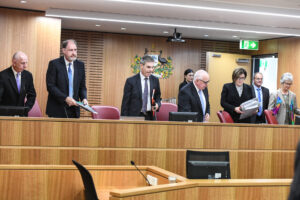The March quarter GDP figures show that while the economy is growing strongly, workers are missing out of their fair share.
The national accounts released on Wednesday revealed that in the first 3 months of 2022 a record level of national income is going to corporate profits. At the same time real unit labour costs for non-farm workers fell 2.3%. Labour market and fiscal policy director, Greg Jericho, notes in his column in Guardian Australia that real (non-farm) unit labour costs are now 5.3% below where they were before the pandemic.
This data provides a strong fact check to arguments that workers need to take a pay cut to prevent rising inflation. The increase in inflation is not coming from labour costs, indeed workers are feeling the pain while in the words of the Bureau of Statistics, “Australian businesses benefited from rising prices.”
The GDP figures reveal that far from needing workers to be the ones who need to shoulder the burden of rising inflation, they clearly already have been the ones who have hurt the most. Asking them to continue to take real wage cuts will not help the economy, it will only exacerbate the shift of income going to profits and not to employees.


You might also like
Chalmers is right, the RBA has smashed the economy
In recent weeks the Treasurer Jim Chalmers has been criticised by the opposition and some conservative economists for pointing out that the 13 interest rate increases have slowed Australia’s economy. But the data shows he is right.
Analysis: Will 2025 be a good or bad year for women workers in Australia?
In 2024 we saw some welcome developments for working women, led by government reforms. Benefits from these changes will continue in 2025. However, this year, technological, social and political changes may challenge working women’s economic security and threaten progress towards gender equality at work Here’s our list of five areas we think will impact on
The continuing irrelevance of minimum wages to future inflation
Minimum and award wages should grow by 5 to 9 per cent this year


